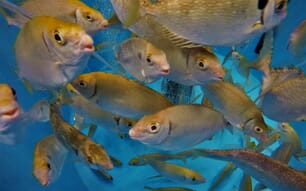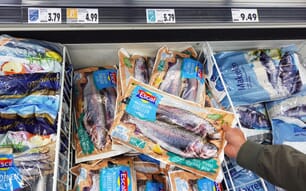According to the World Aquaculture Society, aquaculture is becoming a crucial factor in meeting the global demand for food proteins as the world population expands and wild fish populations approach their biological limits. In order to meet demand for fish, the United Nations Food and Agriculture Organization predicts that nearly half of the supply will be met by aquaculture by 2030.
The future success of aquaculture depends on developing and adopting technologies that allow efficient and environmentally sustainable production. Health management solutions are a critical part of this. To deal with disease, farmers and veterinarians require fish health management tools that are effective, environmentally responsible and acceptable to the public.
Novartis recently added the state-of-the art aquarium to better support vaccine and pharmaceutical development for a variety of farmed fish species, including salmon, carp, marine fish, tilapia and catfish.
"By expanding our facilities, we are supporting aquaculture through continued in-depth study of health solutions for the challenges that face both currently cultured and emerging species of fish and shellfish," says Grant Roberts, president and CEO of Novartis Animal Health Canada. "A high percentage of the profits from aquaculture vaccine sales goes back into research and development to create vaccines that are targeted and timely."
The improved area of the aqua facility is already being utilized. Recipient of a $1.8 million, five-year investment from the Atlantic Canada Opportunities Agency's Atlantic Innovation Fund, Novartis is developing an immunization strategy to help prevent koi herpes virus (KHV). KHV is the most significant disease problem facing carp and ornamental koi farmers today. In addition to working to develop a KHV vaccine, Novartis is also striving to develop technology for the rapid identification of antigens in other target diseases.
In 2005, Novartis obtained licensure for the first DNA-based vaccine that protects farm-raised salmon against infectious haematopoietic necrosis virus (IHN). This viral disease causes serious economic losses for the salmon industry in British Columbia, Canada. Novartis also developed the first vaccine for protection against infectious salmon anaemia virus (ISA).
"By playing our role in developing these highly effective fish health management tools, we are enabling aquaculturists to meet the demand for fish products, and in the process, helping to conserve many endangered fisheries and fish stocks," says Roberts.
According to Novartis Global Head, George Gunn, the company's aquaculture business - while a small percentage of its total global sales - has ambitious growth objectives calling for a significant increase in the size of the global business by 2010. Calling the aquaculture segment of its business one of the most dynamic, Gunn expressed Novartis' vision of further building on its leadership position in the aqua health vaccine market worldwide.
"Novartis is currently focused on salmon farming in Canada, Chile, the Scandinavian countries and the United Kingdom, where we are among the market leaders," says Gunn. "With the projected growth in fish consumption continuing to rise through the year 2020, we see many untapped opportunities for disease-preventing vaccines in warm water fish species, in addition to our core business in the salmon farming markets."
Collaborations between business, research organizations and government are working to make bioscience a key economic engine in PEI, where there is a strategic intent to build on current strength in bioscience that exists in the province.
"A world renowned global company such as Novartis opening a site in Prince Edward Island very much reflects the caliber of infrastructure, resources, expertise, and capabilities we have been able to establish in this province to date," says Pat Binns, premier of PEI. "The Provincial Government has been an active partner in the development of the PEI bioscience sector with significant investments into the new National Research Council Institute of Nutrisciences and Health, the Food Technology Center expansions, our new Research and Development Fund, and our new Innovation and Development Tax Credit. The encouragement of a cluster that enhances research and development, a highly skilled workforce, and business investment opportunities is a cluster we are proud to support."
Partnerships with Atlantic Veterinary College at the University of Prince Edward Island, along with Atlantic Canada, and national and international institutions help facilitate an efficient and environmentally sustainable aquaculture industry.
Expansion Bolsters Novartis Aquaculture Vaccine
CHARLOTTETOWN - Fish farmers can anticipate more solutions to help prevent and control disease-causing pathogens. A new aquarium at Novartis Animal Health's Center for Aqua Research and Development in Victoria, Prince Edward Island (PEI), Canada, allows for continued innovative research and development of vaccines for the aquaculture industry.



